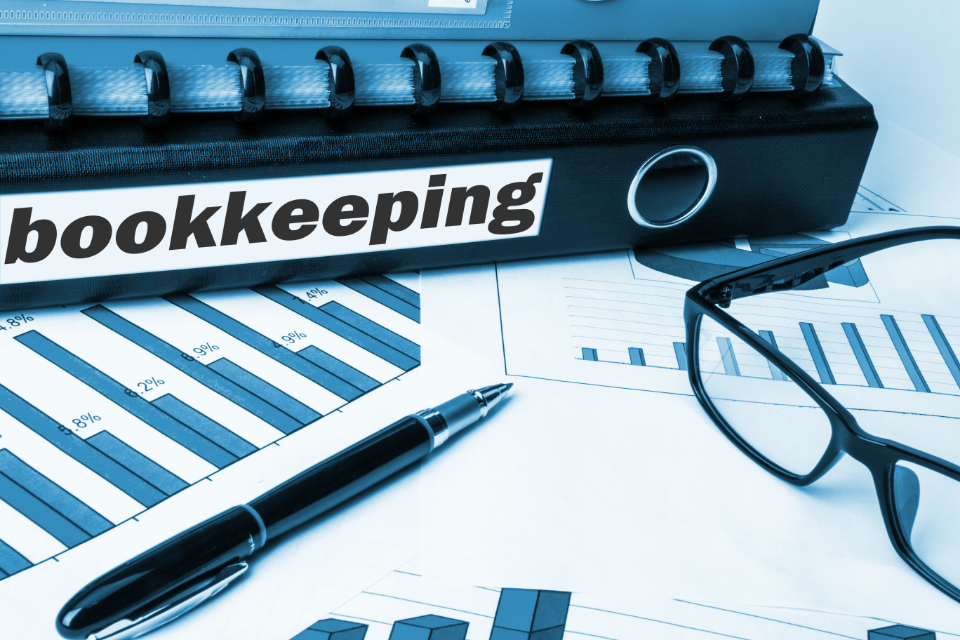You might have heard the term 'bookkeeping' many times, but there are chances that you might not know what it means. Bookkeeping for small businesses might sound like something simple, but there are several layers. If you are running a small business, bookkeeping is an essential practice for you. Bookkeeping for small businesses can seem challenging, but you can do it with ease if you understand the basics.
With bookkeeping for small business, you can record everything to have a tab on your business. If you want to learn bookkeeping essentials, we are here to help. Read on to know everything about keeping. Here's what you need to know if starting with the bookkeeping for small business process.
- What is Bookkeeping?
- The role of a bookkeeper
- Importance of bookkeeping for small business
- Tracking profits
- Tracking finances and cash flows
- Prepares you for taxes
- Easy reporting
- Performance evaluation and future planning
- Which financial records should you maintain?
- Kinds of Financial Reports
- Bookkeeping methods
- Bookkeeping entry system
- Final thoughts
- How Can Deskera Payroll Help?
- Key Takeaways
What is Bookkeeping?
Bookkeeping involves keeping track of your company's financial transactions, so you know how much money you're making and where it's going. It's essential for running a lucrative business—after all, if you don't know how much money you're generating or where it's going, you'll struggle to identify ways to increase profits. Bookkeeping for small business is an essential practice as the companies do not follow any advanced system of recording the transactions.
If you are new to bookkeeping for small business, there are chances that you might feel overwhelmed. There are several tools available online that can help you with the bookkeeping process. There is no need to start with elaborate ledgers and columns. You can make a notebook and record all of your transactions there.
However, going digital is the best way to don't misplace or lose the physical records you maintain. You can use free software for bookkeeping for small business. Several companies also hire an expert to update the books of business. Having a dedicated resource is a hassle-free process as then you can focus on other essential activities that directly affect the business.
We'll break down bookkeeping for small business into its most basic elements below. Along with reading this page for a basic explanation of bookkeeping for small business, you should consult an accountant to understand the needs and requirements. A financial professional may provide tailored bookkeeping assistance tailored to your specific business while also providing a more detailed look at the primary principles we've covered.
The role of a bookkeeper
Bookkeeping is when the element of accounting that deals with the collecting and organization of financial documents. It means that the bookkeeper's responsibility is to collect, arrange, and file all financial data for your business. A bookkeeper is responsible for managing the following documents for the process of bookkeeping for small business:
- Receipts
- Bills or invoices
- Records of salary and payroll
- Any bank statements
- Credit card statements
- Forms related to tax and returns
Accounting includes these data-gathering responsibilities, which also involve analyzing numbers and forecasting profit and loss. However, the phrase 'bookkeeping' does not necessarily imply such long-term calculations and analyses. On the other hand, good accounting guarantees that you have the figures and data you need to help your accountant make future projections and diagnose your company's financial health when it comes to bookkeeping for small business. The analysis of information is slowly becoming an integral part of the bookkeeping for small business.
Importance of bookkeeping for small business
Bookkeeping for small business is a mandatory business activity, and you can't do without it. While several people might consider it a routine process and do not see any relevance in it, there are several benefits of bookkeeping for small business:
Tracking profits
You may track your company's profitability over time and prepare methods to improve it in the future by monitoring its profitability. Profitability metrics simplify log transactions and determine how much money your company makes on inventory. When you have the numbers available, it is easy to calculate the profitability ratios. These ratios will help in analyzing the profitability of the company. When it comes to bookkeeping for small business, it is even more critical to track the profitablility of the company for the initial years.
Tracking finances and cash flows
If you are a small business owner, you must have an overview of all the sources of revenue. When your business is relatively small, and you have around 2-3 clients, you might not even need bookkeeping small business. However, if the number of clients increases beyond that, it might be nearly impossible for you to keep track of your revenue streams. Therefore, with bookkeeping for small business, you can identify all your revenue streams and get an overview of the money you are receiving and your spending.
Bookkeeping for small business will also give you an idea of the cash you have in hand and if that will be enough to manage all of your business expenses. When you maintain a proper financial record, you can also understand the company's financial health.
Prepares you for taxes
If you're starting a business, you can save a lot of your time by recording all transactions as and when they happen. This eliminates the need to track critical financial data at the last-minute end of the fiscal period. You can determine the sorts of taxes and compute the amount payable in advance with adequate recordkeeping. Bookkeeping for small business will help you calculate the tax even before paying it so that you are not in for any last-minute surprises.
Easy reporting
As long as bookkeeping for small business is concerned, you are responsible for disclosing some critical financial facts and figures about your company to potential investors and other stakeholders as a business owner. You can use bookkeeping software that generates charts and graphs to show your financial performance, which will help you woo the investors better. Bookkeeping for small business aids the funding aspect of the company too.
You're also keeping your staff informed about your company's financial situation. They want to understand how they can contribute towards the organization. Once you practice bookkeeping for small business, you will be able to present an accurate picture of the company in front of your employees to feel included and get a direction for the company.
Performance evaluation and future planning
When you practice bookkeeping for small business, you can go back to your financial records and understand how well your company is doing. You can find trends and patterns and compare them with previous years to understand what can be made better. Bookkeeping for small business acts as an avenue where you might find ways to save money.
Proper bookkeeping for small business also allows you to identify areas of your business that could use some improvement. Setting forecasts and forecasting your organization's future is essential if you own a small business. Bookkeeping accounting informs you if your small business requires additional personnel or operational improvements.
Which financial records should you maintain?
When you are bookkeeping for small business, you need to understand the documents you must keep safe as they might be used later as evidence of a transaction. You must try to set aside and keep safely all of the following:
- Receipts
- Bills or invoices
- Records of salary and payroll
- Any bank statements
- Credit card statements
- Forms related to tax and returns
You must organize your records to find a document when you need it quickly. You can use a proper file and then use labels to mark the files stored in a file and their dates. While keeping physical copies is a good idea, holding a digital copy of these documents is even more beneficial for bookkeeping for small business.
Also, if you are bookkeeping for a small business, you need to have the tax records for the last six years. Taxes play a vital role in any business, and hence you need to keep all the necessary documents with you.
Kinds of Financial Reports
The job of a bookkeeper does not end after recording all the small business transactions. There is a lot more to it. As a bookkeeper, you need to get into financial reporting and prepare the following during bookkeeping for small businesses:
- Balance Sheet: A balance sheet gives you an idea of the assets you hold and the liabilities you have. It provides an accurate representation of the financial health of the company. Generally, a Balance Sheet is made at the end of the financial year, but you can choose to make it quarterly too. Specifically, when it comes to bookkeepng for small businesses, creating a balance sheet statement at least once every year is crucial.
- Income Statement: The Income Statement shows your company's revenues and all the expenses that a company incurs. The Income Statement helps you get the numbers of the company's gross profit and net profit.
- Cash flow Statement: A cash flow statement shows all the inflows or outflows of cash in the business
If you are bookkeeping for a small business, you need to create these statements at least once a year. Additionally, you can also make monthly or quarterly statements to get the company's financial pulse.
Bookkeeping methods
There are different ways of bookkeeping for small business. Some of these ways are:
Manual bookkeeping
Manual bookkeeping is the traditional way of maintaining your book of accounts. Here, you can go with the pen-paper method, where you can record all of the transactions in a notebook. Alternatively, you can use an offline application like Microsoft Excel to record all of your financial transactions regarding bookkeeping for small business. Manual bookkeeping is prone to a lot of errors, and that's what makes it less desirable for small businesses. This method of bookkeeping for small business is most commonly used.
Online bookkeeping
When you use online bookkeeping for small business, you choose to use software for recording all of your financial transactions and make all kinds of calculations that can help you assess the company's performance. An online bookkeeping system gives you a more effective way to track all of your incomes and expenditures when it comes to bookkeeping for small business.
When you opt-in for online bookkeeping for small business, you can directly link your bank account to the program so that the transactions get logged in automatically.
Bookkeeping entry system
There are two ways of entering your transaction details if you are bookkeeping for a small business. These two ways are:
- Single entry system
- Double-entry system
When you use a single-entry system, only one entry is added to that ledger for that transaction. For instance, if you sell a book, you enter the receipt of the money you receive in place of that book.
In the case of a double-entry system of bookkeeping for small business, you record two aspects of every transaction. For instance, if you sell a book for $20, you will record $20 as the revenue from the transaction and a deduction of $20 from your inventory as you sell off a book worth $20.
Incorporating a single-entry accounting system is much easier as every transaction is recorded just once, especially for bookkeeping for small business. However, it is ideal for companies that have just started or you are doing a side-gig along with your primary business.
However, as your business grows and the tax requirements of the companies increases, it is better to follow the double-entry system of accounting. If you follow a double-entry system, the chances of committing errors are relatively less as you check two accounts before entering the transaction as far as bookkeeping for small business is concerned.
Final thoughts
Bookkeeping for small business might seem daunting and complicated at first, and you may easily transition into the process. It would be best to be vigilant while maintaining the books of accounts. If you are bookkeeping for a small business, you must try to save all of your receipts and documents to easily refer to them if you need them in any case. You must also decide on the bookkeeping method and the entry system you want to use for bookkeeping for small business. If you are using online software, you must make sure that you use software that also provides an analysis of all the transactions.
How Can Deskera Payroll Help?
Payroll management and employee management are integral to any organization. If you are looking for a holistic and automated tool to manage payroll, employees, expenses, contractor management, Deskera People could be the apt solution.
Process your payroll now with Deskera People
Key Takeaways
Bookkeeping for small business is a process where you record all the company's financial transactions. As a bookkeeper, you must store all kinds of documents that prove a financial transaction. Some of these documents are:
- Receipts
- Bills or invoices
- Records of salary and payroll
- Any bank statements
- Credit card statements
- Forms related to tax and returns
Several kinds of financial statements need to be prepared during the bookkeeping for small business. These financial statements are:
- Balance Sheet
- Income Statement
- Cash flow statement
Also, there are two available methods of bookkeeping for small business:
- Manual Bookkeeping
- Online bookkeeping
Lastly, the entries that are made to any books of accounts can be done in two ways:
- Single entry system
- Double-entry system
Once you understand everything about bookkeeping for small business, you can easily maintain the books of accounts of a company.
Related Articles











